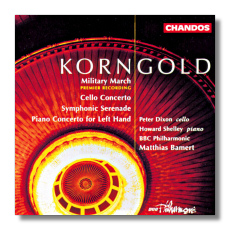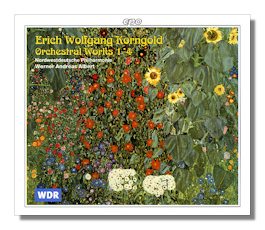
The Internet's Premier Classical Music Source
Related Links
- Korngold Reviews
- Latest Reviews
- More Reviews
-
By Composer
-
Collections
DVD & Blu-ray
Books
Concert Reviews
Articles/Interviews
Software
Audio
Search Amazon
Recommended Links
Site News
 CD Review
CD Review
Erich Wolfgang Korngold

Orchestral Works
- Military March in B Flat Major
- Cello Concerto in C Major, Op. 37
- Symphonic Serenade for String Orchestra in B Flat Major, Op. 39
- Piano Concerto in C Sharp Major (for Left Hand), Op. 17
Peter Dixon, cello
Howard Shelley, piano
BBC Philharmonic Orchestra/Matthias Bamert
Chandos CHAN9508 75:39
Reissued on Chandos CHAN10433X: Amazon - UK - Germany - Canada - France - Japan - ArkivMusic - CD Universe - JPC


- Der Schneemann:
- Prélude & Serenade
- Entr'acte
- Schauspiel-Ouvertüre, Op. 4
- Sinfonietta, Op. 5
- Viel Larm um Nichts, Op. 11
- Symphonic Overture "Sursum corda", Op. 13
- Piano Concerto in C Sharp Major (for Left Hand), Op. 17
- Baby Serenade, Op. 24
- Cello Concerto in C Major, Op. 37
- Symphonic Serenade for String Orchestra in B Flat Major, Op. 39
- Symphony in F Sharp Major, Op. 40
- Theme and Variations, Op. 42
- Straussiana
Julius Berger, cello
Steven de Groote, piano
Northwest German Philharmonic Orchestra/Werner Andreas Albert
CPO 999150-2 4CDs: 63:39, 70:24, 65:48, 68:02
Summary for the Busy Executive: Music mostly mit Schlag.
If sweet tunes and sumptuous orchestration constituted all the necessary for a great composer, Korngold would count as one of the greatest. Furthermore, a vein of genuine, individual poetry runs through just about everything he wrote. Korngold, of course, began his career as a prodigy, and many bet on him as the next great heir to Wagner and Richard Strauss. Unfortunately, things turned out a little differently. I think most music lovers would now acknowledge the "vulgar" and "clumsy" Mahler as Next in Line. While Korngold's catalogue contains marvelous pieces, there's nothing at the level of the revelatory – the thing that tells you that a new world of music opened up – nothing like the Siegfried-Idyl, Rosenkavalier, or Das Lied von der Erde.
Still, revelation isn't everything and probably not a particularly healthy regimen day after day. After all, we live at all sorts of levels, and art, I believe, should speak to all of them.
Korngold's music seems to me very much of its own place and time – the Viennese fin de siècle. I listen to the music and think of Klimt and Hofmannstahl, where decoration and opulence nearly dominate the message. It's sensuous, sensual art, much like Debussy and Ravel at the same time, but heavier on the perfume, gold lamé, and red velvet. If Mahler (and even Strauss) aim for transcendence, Korngold loves the here and now. Musically, he follows Strauss rather than Brahms, Bruckner, or Mahler. He differs from Strauss, however, in that his instincts seem more lyrical than dramatic – a Schubert rather than a Verdi. I recognize the oddness of my opinion, since of course Korngold was celebrated for his operas and his film scores. I certainly don't deny their effectiveness, but they're strange operas. Dramatic music aims to tell a story through the illumination of character. Lyric music aims to paint a mood. I know something of the complexity of the Empress's character from the music of Die Frau ohne Schatten. I know nothing of, say, Robin Hood other than his generic heroism, and I certainly don't know what distinguishes him from Captain Blood by the music of either film. I stress that this is not a difference in merit between music of Strauss and Korngold (although I do believe Strauss the more comprehensive composer), but a difference in type, in what the music does.
Korngold has enjoyed a recent mini-boom in the number of recordings. If you don't know the music and you enjoy a good post-Romantic wallow, you have lots to choose from. The performances here are no more than adequate, except that they both bring obscure pieces to light. Bamert's errs on the side of spongy rhythm. You can get away with that on some pieces, like the light Military March in B Flat Major. But the sharper edges of the cello and piano concerti and the thick string writing in the Symphonic Serenade demand crisp attack and tighter rhythm.
For me, the Symphonic Serenade stands as one of the finest pieces Korngold wrote. Indeed, it's one of the best string pieces by anybody – a sophisticated entertainment along the lines of the Tchaikovsky Serenade, although far more technically difficult than the Tchaikovsky. It revels in the different sounds string instruments can produce. Korngold wrote it after a substantial hiatus from concert composition. It comes from the Forties and reflects a different attitude toward musical material than previous Korngold works. It's covered in less of Viennese Schlag than the works prior to Korngold's Hollywood adventure. The main theme of the first movement, a sonata in fact, seems both odd, considered by itself, as well as intractable to development. Here Korngold shows his considerable composing chops, producing something both beautiful and surprising. Throughout the Serenade the composer shows an expanded harmonic sense – something more adventurous than even Richard Strauss and more astringent, yet recognizably Korngold. The work seems caught between Late Romanticism and Modernism, in a way similar to, say, Havergal Brian's early symphonies or Schoenberg's first Kammersymphonie. It produces an engaging tension, and it allows the work to become something more than merely pretty. For example, the slow movement begins as a gorgeous Straussian chorale. About half-way through, Korngold seems almost to lose his harmonic mind, as the tonality, suddenly jagged and tortured, heads for the planet Pluto and beyond. Mines lie in wait for performers and conductor. In addition to Korngold's usual demand for laser-precise intonation, the instrumentalists must also perform certain movements at top speed. Also, the structure of every single movement is complex enough to give a conductor fits. Nothing here can be taken for granted. Bamert passes the test of conveying the architecture, and the performance gets a huge lift in the chorale movement. But the quicker movements disappoint, mainly because the BBC's attacks fall all over the place. The Northwest German Philharmonic does better on the attacks, with a resulting greater clarity of inner parts, but they also play more raw. On the other hand, the second-movement "Intermezzo" (really a scherzo marked "as fast as possible") teeters on the edge of unraveling altogether. The BBC may not have an attack unanimous enough to suit me, but at least it's always the same variance. And they have a far more elegant sense of line, to boot. Furthermore, there's nothing in Albert's reading that approaches the transcendence of Bamert's "Lento religioso."
The piano concerto for the left hand, written in the Twenties for Paul Wittgenstein sadly has many more problems. It's in one huge movement, with major subdivisions. In a way, it reminds me a little of the Strauss Burleske in d, in that a rhythmic idea, announced at the beginning, dominates much of what goes on. Again, the opening theme seems to resist development, if you consider it all by yourself, and again Korngold triumphs over it. However, through long stretches Korngold seems to lose focus, to drop the thread of the argument, and to mumble to himself. It tends to sprawl, to lose shape. Bamert and Shelley work wonders, although again I could use a sharper attack than what Bamert gets from the BBC. Still, they do meet the larger issue of coherence, and there's a great deal of elegance to the performance besides. Albert and de Groote don't come up to that mark, with de Groote banging away and Albert and his players doing the orchestral equivalent. They also take about seven minutes longer than the British, and they plod, plod, plod. Incidentally, this may be one of the few of Wittgenstein's commissions which the pianist (a difficult personality, to put it mildly) didn't try to revise. He offered to "help" Ravel's concerto for the left hand and was so disdainful of Hindemith's entry (recently discovered among the pianist's papers) that he locked it away for many years, not only refusing to perform it himself, but also keeping others from performing it.
Nevertheless, the Germans I think have it all over the BBC in the cello concerto, simply because they do scratch and claw at it. Bamert here is just too suave. This score has edges. Even so, the best recording of this I've heard by far comes from Charles Gerhardt and soloist Francisco Garbarro in the RCA Korngold series produced by the composer's son, George. The whole series of film music by such luminaries as Steiner, Waxman, Rózsa, Newman, Herrmann, and Korngold – one of the finest series of anything in the stereo era – languishes now, unbelievably, out of print. RCA deserves to swirl down whatever vortex Dante has reserved for idiots.
So much for the duplications among these two releases. The CPO set has more goodies which, if you don't already own them, you might consider. Nevertheless, the advantage is strictly that of one-stop shopping. The performances are professional, but not outstanding, a few steps up from a mere read-through. Recordings have served the symphony particularly well, and two releases stand out. The first, produced by George Korngold as a kind of pendant to the RCA series, features a lush Romantic reading by Rudolf Kempe, who shows us the links to the more radical side of Richard Strauss (Varese Sarabande VSD-5346). The second, leaner account, led by Franz Welser-Möst, emphasizes the Modern side of the score. At any rate, I wouldn't get the four-disc CPO set just for the symphony. You may wish to wait for recording companies to come to their senses and to record more Korngold. On the other hand, this is very attractive music indeed, even in less-than-stellar readings.
Chandos' sound is excellent; cpo's a bit harsh.
Copyright © 2003, Steve Schwartz





















